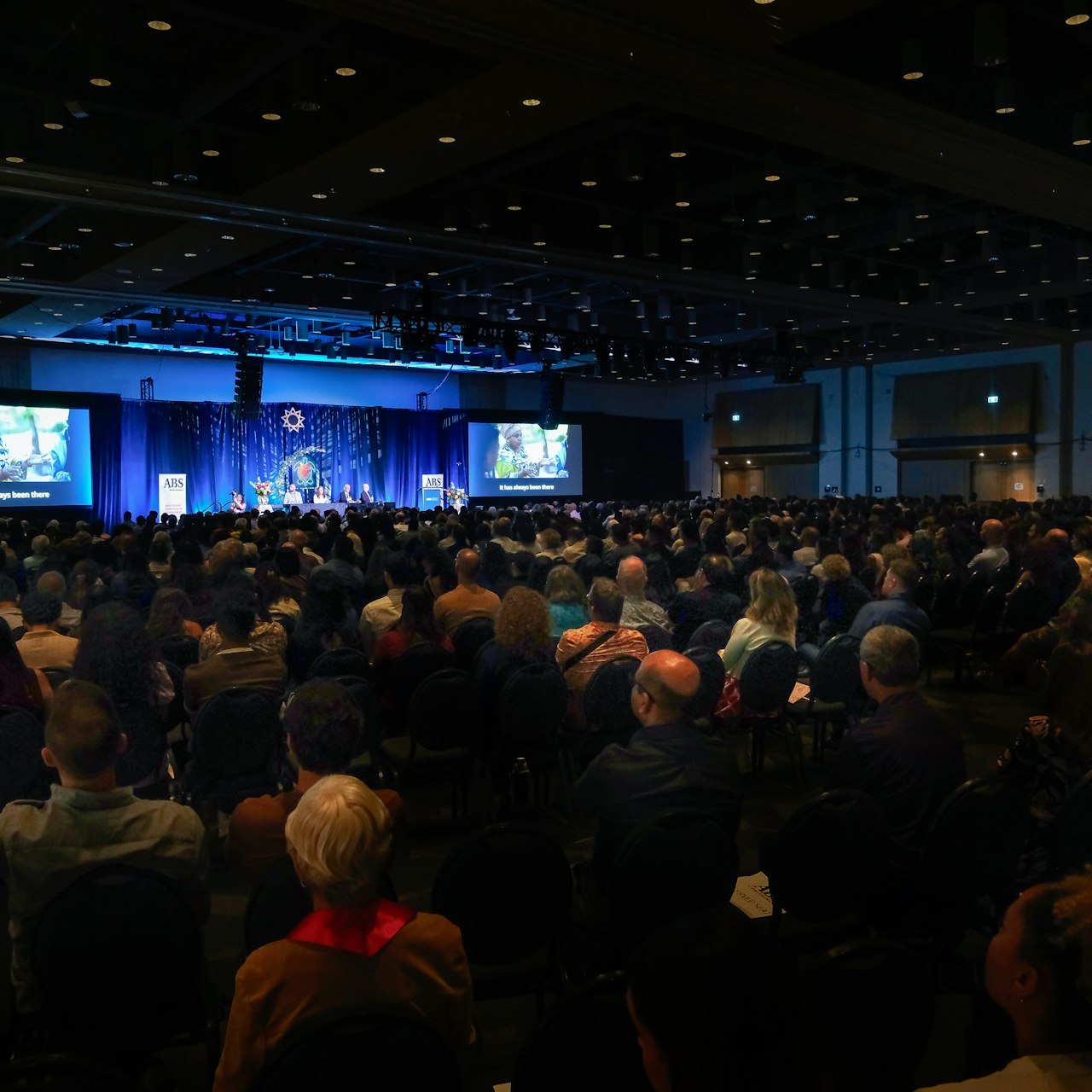
Association for Bahá’í Studies
Towards a reimagining of academic enquiry
Participants of the 49th conference of the ABS explore the application of the Bahá’í teachings to a wide array of prevalent discourses on the wellbeing of humanity.

Participants of the 49th conference of the ABS explore the application of the Bahá’í teachings to a wide array of prevalent discourses on the wellbeing of humanity.
CALGARY, ALBERTA, Canada — In a conference room at the University of Calgary, a young healthcare professional was describing a moment of profound realization. As someone trained in her field to watch for hidden motives when families sought certain medical outcomes beyond their stated concerns, she had internalized a fundamental assumption about human nature: approach others with suspicion, guard against manipulation.
“I remember at a certain point asking myself, is this the orientation that I would take when I am engaged in community-building activities?” she reflected. “Actually, no. I have this whole other set of principles that really emphasizes the nobility of the human being.”
This tension—between professional training and spiritual conviction—reflects a deeper inquiry taking place within academic and professional circles across North America.
At the 49th annual conference of the Association for Bahá’í Studies, some 2,000 participants gathered in a forum to present research and to reimagine how scholarship itself might be conducted.
The four-day gathering, held last month in Calgary, served as a convergence point for the Association’s expanding constellation of year-round activities. During the first two days, 19 thematic seminars brought together over 300 participants for focused explorations of topics ranging from technology and healthcare to evolution and consciousness.
Exploring new approaches to academic inquiry
What was apparent from this gathering is not merely another approach to interdisciplinary scholarship, but a glimpse of how academic inquiry might function in service of collective advancement.
“By systematically applying principles of consultation, unity in diversity, and the harmony of science and religion, participants have created spaces where intellectual rigor and spiritual insight reinforce and nourish rather than compete with each other,” said Todd Smith, a member of the Association’s executive committee.
Central to this distinctive approach is the application of consultation as both a spiritual principle and an approach to collaborative inquiry.
Selvi Adaikkalam Zabihi, a member of the Association’s committee for collaborative initiatives, said, “When you are trying to examine a set of assumptions in a field that may be implicit and that no one has ever articulated to you, it is really helpful to be able to draw on the power that comes from bringing different perspectives together, to be able to consult and to seek truth collectively instead of solely as an individual.
“Our individual perspectives are always so limited,” continued Ms. Zabihi. “We gain from being able to connect with other minds and other experiences.”
While academic inquiry has long valued rigorous debate and the testing of ideas, participants described consultation as offering a complementary approach—a collective search for truth that generates what one speaker called “fellow feeling” across diverse academic perspectives and enhances scholarly inquiry. “The collective exploration of truth among a group of people has proven effective in generating more sound and fruitful ideas,” said Tara Raam, a neuroscientist. “When diverse minds come together in a spirit of genuine search, the insights that emerge often surpass what any individual perspective might achieve alone.”
This consultative approach has enabled unprecedented collaboration across traditionally divided fields. Andrea Robinson, a critical care physician and facilitator of the health and healthcare seminar, said, “Practitioners from different medical traditions, groups that often find themselves at odds in other settings, came together to examine underlying assumptions in healthcare through the lens of spiritual principles.”
Across the Association’s spaces of exploration, the Bahá’í principle of the harmony of science and religion has been central to discussions on how spiritual principles can expand rather than constrain academic inquiry, offering fresh perspectives on longstanding challenges.
Dr. Raam, who facilitated sessions on evolution and consciousness, described how that principle shapes her approach to neuroscience: “Science and religion are complementary bodies of knowledge and practice that mutually inform each other and reinforce each other. The insights that we generate through science, through the study of the physical world, can inform and help us better understand spiritual principles. And likewise, spiritual principles and teachings can shape the types of research questions that we are interested in.”
Applying principles across disciplines
The Association’s understanding of scholarship goes far beyond integrating “spiritual language” into existing frameworks or treating faith as a separate compartment alongside professional work.
“The purpose of this Association is to explore the application of the Bahá’í teachings to a wide array of prevalent discourses pertaining to the future and well-being of humanity,” said Shabnam Koirala-Azad, another member of the Association’s executive committee. “People gather together so they can read the reality in their professions, in their disciplines, to really think about points of alignment and to correlate them with Bahá’í principles.”
In a technology seminar, participants grappled with how communities might gain more agency in technological choices that affect their lives. In another on library science, they explored how conceptions of human nature shape information access. In the healthcare seminar, they examined whether current models adequately account for spiritual dimensions of healing. In yet another seminar on the theme of reconciliation, attendees looked at how consultation and Indigenous wisdom can lead to constructive dialogue and exploration.
As the conference concluded, participants were energized and looked forward to continuing their rich explorations in the many forums that will emerge over the coming year.
Recordings of selected plenary sessions from this year’s conference are available at the ABS website.